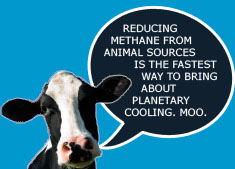Indications of Global Warming
Climate change is happening so fast at the moment that many of the events we are witnessing are beyond the scientists’ worst case scenarios, causing environmental leaders such as former US Vice President Al Gore and preeminent climatologist head of NASA’s Goddard Institute of Space Studies Dr. James Hansen to warn of dire threats to human existence.
During a speech to the US Senate in late January 2008, Vice President Gore stated “We have arrived at a moment of decision...What is at risk of being destroyed is not the planet itself, of course, but the conditions that have made it hospitable for human beings.”
It has also become a widespread understanding in the earth science community that one of the cornerstones of addressing climate change is to reduce the consumption of animal products, including calls from UN IPCC chief Dr. Rajendra Pachauri and UN Framework Convention on Climate Change leader Dr. Yvo de Boer. Like many earth scientists, Dr. Pachauri transitioned to a vegetarian diet about eight years ago and have recently become an increasingly vocal advocate of reducing meat consumption to save the planet. When discussing the role of biofuels in rising food prices, which only account used five percent of global grain supplies in 2008, Dr. de Boer noted the real issue was livestock, which are fed 36 percent of global grain reserves, hence cutting back on meat consumption would be a more effective choice of action.
It is imperative that the global human community face up to the need to act immediately to save our planet – as in the next two years. The scientific community has been telling us for quite some time that we are fast reaching tipping points beyond which runaway global warming will occur which threatens the very existence of humanity.
Addressing the National Press club in June 2008, Dr. Hansen was more direct saying “We’re toast if we don’t get on a very different path.” He spoke of the possibility of mass human extinctions coming in twenty years if we don’t act immediately, pointing to tipping points beyond which there is no return occurring now. He stated “We see a tipping point occurring right before our eyes. Arctic is the first tipping point, and it's occurring exactly the way we said it would.”
An international team of researchers published a report on nine dangerous tipping points due to human-caused activities, beyond which we would experience run-away global warming. The research paper Tipping Elements in the Earth’s Climate System, explores each of these tipping points along with an estimated timing and likelihood. The information below shows the evidence that the planet is already coming close to some of them.
Arctic Sea IceBecause Arctic Sea ice floats in the sea, it’s melting is not expected to raise sea levels much, but what it would do is speed the rate at which ocean temperatures increase. Right now the white ice reflects much of the sun’s rays back up into the atmosphere. With the sea ice melting, the ocean water absorbs the sun’s rays, warming the oceans, and setting off a series of predicted events, including disruptions of the oceanic cycles, which would affect weather patterns. The warmer oceans would also be devastating for ocean ecosystems.
Read more
Because Greenland’s glaciers are not floating in the ocean, but is land based ice, melting of her ice sheets entirely would displace a large quantity of water into the ocean raising the sea levels more than seven meters. Based on current models this is anticipated to occur within about 300 years, but with recent changes in climate this is likely to be less.
Read more
When the UN’s Intergovernmental Panel on Climate Change’s most recent reports were published, melting in Antarctica was not included as a factor.
Read more
The northern forests of Canada, Finland, Russia, Alaska, Norway and Sweden play and important role in filtering water, storing carbon and supporting a wide biodiversity of animals. Warmer temperatures help increase the threat of disease by making it easier for harmful insects to multiply and infest the trees, as well as increasing the threat of disease and fire.
Read more
A disruption in the Indian Monsoon season would be highly disruptive for over a billion people in India, Pakistan, Bangladesh and Nepal. Greenhouse warming causes the monsoon to pick up more water, making storms more intense and leading to massive flooding, such as we have seen for the past few summers, while air pollution and land use weakens the monsoon, leaving the people at risk of drought.
Read more
A disruption in the Atlantic Ocean’s circulation would lead to a shift in the tropical rainbelt, which transports heat from the tropics to Northern Europe. Warming oceans or an increase in freshwater flowing into the ocean each threaten the oceans circulatory pattern.
Read more
Global warming can lead to a longer dry season in the Amazon, viewed as the lungs of the earth and the largest tropical rainforest on the planet. A longer dry season is likely to lead to a die off of trees. Deforestation alone could push the Amazon past a tipping point, triggering seasonal weather changes to longer dry seasons.
Read more
Greenhouse gases could lead to the increase of monsoon activity, while rising temperatures on a global basis could lead to the collapse of the monsoon. The potential for increased monsoon activity in the Western Sahara would lead to greening and be one of the few potential ironic benefits of global warming, but a tipping point indicator nevertheless.
El Nino Southern OscillationSouth East Asia would experience greater drought if the El Nino Southern Oscillation in the Pacific were changed.
Other Global Warming Indications
Heat waves and Cold snapsThe global warming brings extreme weather. A months worth of rain falls in a day, heat waves threaten lives, and cold snaps also occur.
Ocean warming, sea level rising, coastal erosion and flooding, islands sinkingAlthough oceans have been valued for their ability to absorb CO2 and keep our climate in balance, the absorption of so much CO2 is acidifying and warming the oceans threatening the potential for survival of coral reefs and the marine ecosystem.
Read more
Glaciers are melting around the world at an alarming rate. As they melt at such a fast rate, they pose the threat of floods, but once they are gone, this source of irrigation water for agriculture is likely to leave farmers without water.
Read more
United Nations Chairman on Climate Change
Agriculture & Climate Change
Nasa Climate Report
Livestock & Environment
Animal agriculture during these modern times affects our environment and contributes to climate change and world hunger.

Click here to view

Eco-Eating facts on meat diet vs. Plant-based diet (1.5 minutes)
THE GREEN PLANET AWARDS RAISE AWARENESS ABOUT THE CRITICAL SITUATION THE ENVIRONMENT IS CURRENTLY IN & HUMAN ACTIONS WHICH INFLUENCE CLIMATE CHANGE![]()
COOL LINKS
Wake Up, Freak Out
Take Aim At Climate Change
Save The Human Music Vid
GENERAL LINKS
Price of Meat
Meat The Facts
Veg Source
Earth Save
Monga Bay
NASA
Eco-eating
SEI
ENFO
Cultivate
Friends of the Earth
United Nations FAO
Hunger Site
One World
Diet, Energy, & Global Warming
HEALTH LINKS
Nutrition Ecology International Center NEIC
The Cancer Project
PCRM
Nutrition MD
Human Herbivore Physiology
ENVIRONMENTAL LINKS
Answering the sceptics
Tree Hugger
Sea Shepard Conservation Society
Permaworld
Grist
VNV.ORG.AU
UN News Centre
Science Daily
Science Daily: Poison ice
Time: Health and Science
Common Dreams
Global Stewards
The Independent
National Geographic
DotEnvironment
Green Peace Reports
IVU
![]()
Vegan: The New Ethics of Eating by Erik Marcus
The Food Revolution by John Robbins
Healthy at 100 by John Robbins
A Delicate Balance (film)
Meat The Truth (film)
The 11th Hour - Narrated by Leonardo DiCaprio (film)
![]()
